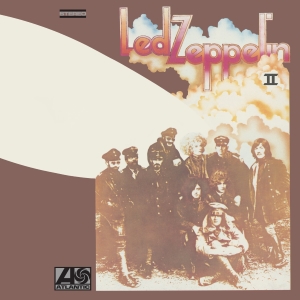Led Zeppelin II
Just a few weeks ago was the fiftieth anniversary of the release of Led Zeppelin's second album, unimaginatively titled Led Zeppelin II. It was their second release of that calendar year, and further emphasized their commitment to re-imagining Chicago blues, by covering some songs and doing a bit of plagiarism (later the credits were updated).
A good example of this is the lead-off track, "Whole Lotta Love," which is one of the most commonly played songs on the album. The lyrics borrowed heavily from a song by Willie Dixon, and after a threat of a lawsuit, he was added to the songwriting credits. It is, of course, heavily sexually charged, with lines like "I'm going to give you every inch of my love," and "I want to be your back door man" (which meant something different back then, but was still pretty dirty).
"The Lemon Song" reworked a Howlin' Wolf song, and added a lyric by Robert Johnson:
"Squeeze me, baby, till the juice runs down my leg,
The way you squeeze my lemon, ah
I'm going to fall right out of bed."
While most of the album is straight forward rock and roll, with familiar songs like "Heartbreaker" and "Living Loving Maid (She's Just A Woman)" some of the songs get a bit airy-fairy, as Robert Plant had much more input on lyrics that on the first album. In "Ramble On" he invokes the world of J.R.R. Tolkien:
"Just in the darkest depths of Mordor
I met a girl so fair.
But Gollum and the evil one
Crept up and slipped away with her"
For 1969, this was entirely appropriate.
The album also includes "Moby Dick," an instrumental that features a long drum solo by John Bonham. The best part of listening to this album is paying attention to the musicianship. Not only was Bonham was the best drummers who ever lived, but the bass playing of John Paul Jones was nonpareil, and of course Jimmy Page was one of the most innovative guitar players of the period.
The album ends with Dixon's "Bring It On Home," for which he receives full credit. It's interesting that British rock, from it's beginnings in the early '60s, was taking American blues and rhythm and blues and translating it for a white audience. This continued all through the decade, perhaps at its apotheosis with Led Zeppelin II, as their later albums would rely less on the blues.
A good example of this is the lead-off track, "Whole Lotta Love," which is one of the most commonly played songs on the album. The lyrics borrowed heavily from a song by Willie Dixon, and after a threat of a lawsuit, he was added to the songwriting credits. It is, of course, heavily sexually charged, with lines like "I'm going to give you every inch of my love," and "I want to be your back door man" (which meant something different back then, but was still pretty dirty).
"The Lemon Song" reworked a Howlin' Wolf song, and added a lyric by Robert Johnson:
"Squeeze me, baby, till the juice runs down my leg,
The way you squeeze my lemon, ah
I'm going to fall right out of bed."
While most of the album is straight forward rock and roll, with familiar songs like "Heartbreaker" and "Living Loving Maid (She's Just A Woman)" some of the songs get a bit airy-fairy, as Robert Plant had much more input on lyrics that on the first album. In "Ramble On" he invokes the world of J.R.R. Tolkien:
"Just in the darkest depths of Mordor
I met a girl so fair.
But Gollum and the evil one
Crept up and slipped away with her"
For 1969, this was entirely appropriate.
The album also includes "Moby Dick," an instrumental that features a long drum solo by John Bonham. The best part of listening to this album is paying attention to the musicianship. Not only was Bonham was the best drummers who ever lived, but the bass playing of John Paul Jones was nonpareil, and of course Jimmy Page was one of the most innovative guitar players of the period.
The album ends with Dixon's "Bring It On Home," for which he receives full credit. It's interesting that British rock, from it's beginnings in the early '60s, was taking American blues and rhythm and blues and translating it for a white audience. This continued all through the decade, perhaps at its apotheosis with Led Zeppelin II, as their later albums would rely less on the blues.



Comments
Post a Comment